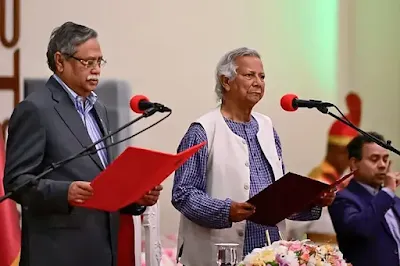But the demonstrations soon grew into a bigger challenge for Hasina’s 15-year rule as more than 300 people, including students, were killed during spiralling violence
 The decision regarding the appointment of Bangladesh's interim government head was made during a meeting between President Shahabuddin and the coordinators of the Anti-Discrimination Student Movement
The decision regarding the appointment of Bangladesh's interim government head was made during a meeting between President Shahabuddin and the coordinators of the Anti-Discrimination Student Movement
Joynal Abedin said that the remaining members of the interim government will be finalized after talks with various political parties, according to the Dhaka Tribune report.
Earlier, a 13-member team from the Anti-Discrimination Student Movement traveled to Bangabhaban to discuss Bangladesh's current situation and the outline of the interim government, Dhaka Tribune reported. They traveled to Bangabhaban on Tuesday at 6 pm (local time) to call on the President and the chiefs of the three armed forces.
Bangladesh is facing a fluid political situation with Sheikh Hasina tendering her resignation from her post in the wake of mounting protests on August 5.
The protests, led mainly by students demanding an end to the quota system for government jobs, evolved into anti-government demonstrations.
A day after Sheikh Hasina resigned as Prime Minister of Bangladesh and left the country, President Mohammed Shahabuddin announced the dissolution of the country's parliament to make way for the formation of an interim administration, Dhaka Tribune reported.
Based on the decision from a meeting of President Shahabuddin with the heads of the three armed forces, leaders of various political parties, representatives of civil society, and leaders of the Students Against Discrimination movement, the national parliament was dissolved, a press release from the president's office stated.
It further said that Bangladesh Nationalist Party (BNP) Chairperson Khaleda Zia has been released from jail. The statement said that the process of releasing those detained in the student movement and various cases from July 1 to August 5 has begun, with many already being freed.
In a statement on Monday, the president's press team said that a meeting led by Shahabuddin had "decided unanimously" to free Khaleda Zia immediately.
"The meeting has also decided to free all the people who have been arrested during the student protests," the president's statement added.Nobel laureate Prof Mohammad Yunus, the designated head of Bangladesh’s interim government, on Wednesday fervently appealed everybody “to stay calm and refrain from all kinds of violence” as the country witnessed a major reshuffle in the security establishment following the ouster of the Sheikh Hasina government.
Army chief Gen Waker-Uz-Zaman announced that the interim government would take oath on Thursday around 8 pm. He said the advisory council may have 15 members. General Zaman said the armed forces would provide all possible support to Yunus
Yunus, whose name was first proposed for the top job by the coordinators of the Students Against Discrimination movement, congratulated the “brave students” who took the lead in making, what he said, “Our second Victory Day possible.”
“Let us make the best use of our new victory. Let us not let this slip away because of our mistakes,” said the 84-year-old economist, who will return home from Paris on Thursday to take charge. He appealed to all students, political parties and non-political people to stay calm.
His appeal comes as the Army chief acknowledged that there were incidents of looting and anarchy after Hasina’s ouster. He said the police forces became “totally dysfunctional” and it was not possible on the part of the military along with the navy and air force troops to “fill the void”.
“But we will do everything possible to bring the culprits to justice,” he added.
With police absent from their duty to keep law and order or manage traffic, students carried out traffic management as volunteers for the second consecutive day on Wednesday. There were reports of attacks on police stations and facilities across the country on Tuesday, resulting in numerous police casualties, which have led to this unprecedented situation, media reports said.
In another development, Additional Inspector General of Police AKM Shahidur Rahman was appointed Director General of elite anti-crime Rapid Action Battalion (RAB) in a reshuffle on Wednesday, according to home ministry, which reconstituted the top positions in the security establishment.
Former PM Khaleda Zia, who was released from jail after the ouster of her arch-rival Hasina, addressed a massive rally of her party in Dhaka where she appealed for peace instead of destruction and revenge to rebuild the country. Zia, 79, was sentenced to 17 years in prison for graft in 2018 under the rule of Hasina. “I have been released now. I want to thank the brave people who were in a do-or-die struggle to make possible the impossible,” said the chairman of the Bangladesh Nationalist Party.
Meanwhile, the Indian High Commission in Dhaka continues to remain functional and its helplines are open for assistance needed by Indian nationals. “Our diplomats and officials are in Dhaka, although non-essential staff and families returned this morning,” a source said, sharing helpline numbers: +8801958383679, +8801958383680 and +8801937400591.


